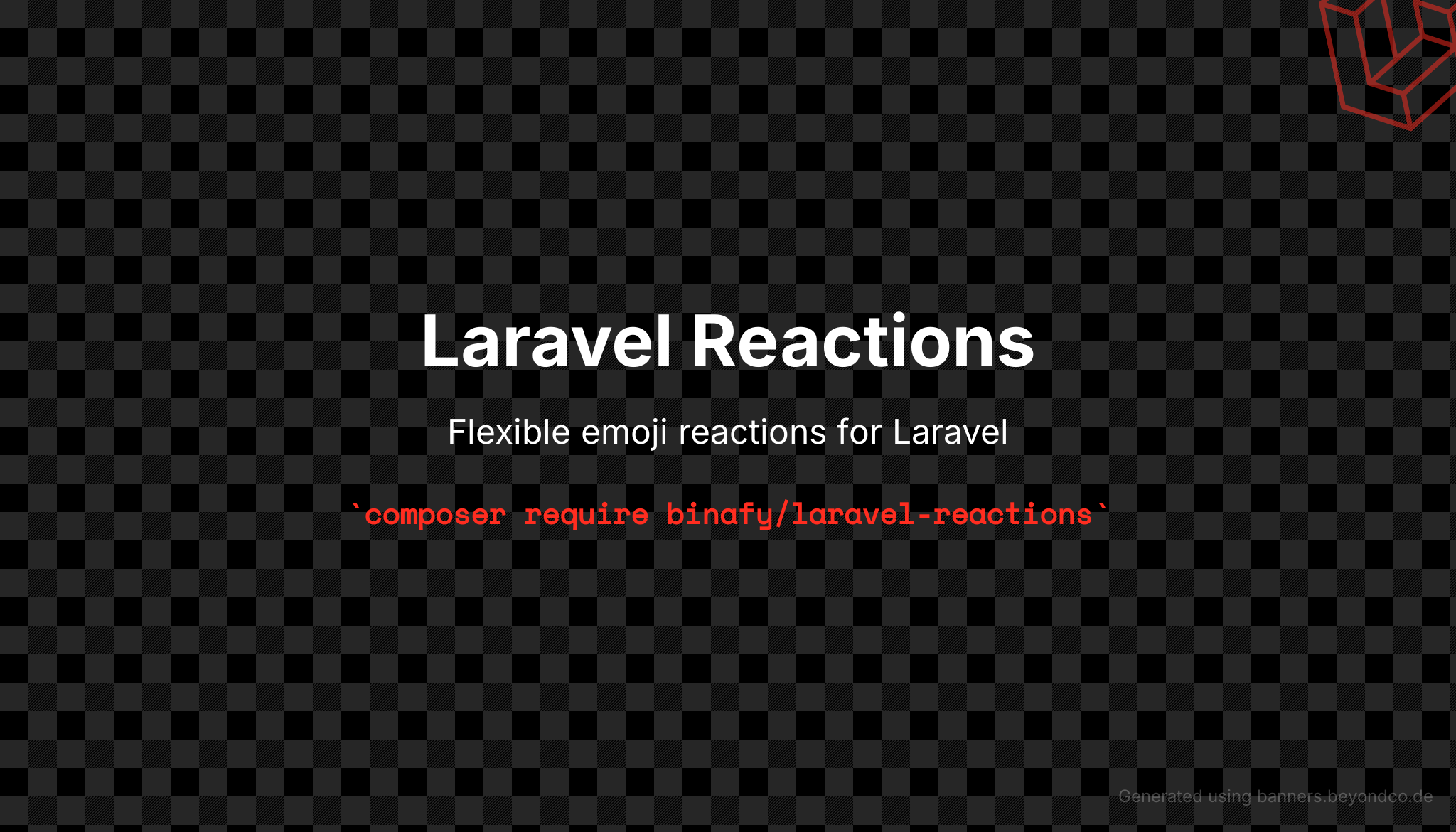Laravel Reactions is a simple and flexible package that enables you to add reaction functionality (such as 👍, ❤️, 😂, etc.) to any Eloquent model in your Laravel application. Whether you're building a social network, blog, or forum, this package makes it easy for users to express themselves through customizable reactions.
🔧 Features:
- Add reactions to any model (e.g., posts, comments, messages)
- Multiple reaction types (like, love, laugh, etc.)
- Easy API for adding/removing reactions
- Track who reacted and how
- Eloquent relationships for seamless integration
- Built-in support for custom reaction types
- Lightweight and easy to customize
PHP >= 8.1Laravel >= 10.0
You can install the package with Composer:
composer require binafy/laravel-reactionsIf you want to publish a config file, you can use this command:
php artisan vendor:publish --tag="laravel-reactions-config"If you want to publish the migrations, you can use this command:
php artisan vendor:publish --tag="laravel-reactions-migrations"For convenience, you can use this command to publish config, migration, and ... files:
php artisan vendor:publish --provider="Binafy\LaravelReaction\Providers\LaravelReactionServiceProvider"Before using reactions, your models need the appropriate traits. User models require the Reactor trait to create reactions, while content models require the Reactable trait to receive reactions.
use Binafy\LaravelReaction\Traits\Reactor;
class User extends Authenticatable
{
use Reactor;
}use Binafy\LaravelReaction\Contracts\HasReaction;
use Binafy\LaravelReaction\Traits\Reactable;
class Post extends Model implements HasReaction
{
use Reactable;
}There are multiple ways to create reactions depending on your application's needs. You can create reactions from the user perspective or from the reactable content perspective.
Users can react to any reactable content using the reaction() method from the Reactor trait:
use Binafy\LaravelReaction\Enums\LaravelReactionTypeEnum;
$user = User::find(1);
$post = Post::find(1);
// Using enum reaction types
$user->reaction(LaravelReactionTypeEnum::REACTION_ANGRY, $post);
// Using custom string reaction types
$user->reaction('love', $post);Reactable content can also initiate reactions, which is useful when you want to handle reactions from the content's perspective:
$post = Post::find(1);
$user = User::find(1);
// Specify the user explicitly
$post->reaction('like', $user);
// Use the currently authenticated user
$post->reaction('like'); // Uses auth()->user()You can check whether content has been reacted to by specific users using the isReacted() method:
$post = Post::find(1);
$user = User::find(1);
// Check if a specific user reacted
if ($post->isReacted($user)) {
echo "User has reacted to this post";
}
// Check if the currently authenticated user reacted
if ($post->isReacted()) {
echo "You have reacted to this post";
}The Reactable trait provides several methods for querying reaction data:
$post = Post::find(1);
// Count specific reaction type
$likeCount = $post->getReactCountByType('like');
$angryCount = $post->getReactCountByType(LaravelReactionTypeEnum::REACTION_ANGRY);$post = Post::find(1);
// Returns collection with type => count pairs
$reactionCounts = $post->getReactionsWithCount();
// Example result: ['like' => 5, 'love' => 3, 'angry' => 1]$post = Post::find(1);
// Get all users who reacted to this post
$reactors = $post->getReactors();Reactions can be removed either by type or completely:
$user = User::find(1);
$post = Post::find(1);
// Remove specific reaction type
$user->removeReaction('like', $post);
// Or from the reactable side
$post->removeReaction('like', $user);
$post->removeReaction('like'); // For authenticated user$user = User::find(1);
$post = Post::find(1);
// Remove all reactions by the user on this post
$user->removeReactions($post);
// Or from the reactable side
$post->removeReactions($user);
$post->removeReactions(); // For authenticated user| Event | Description |
|---|---|
StoreReactionEvent |
When store new reaction |
RemoveReactionEvent |
When remove a reaction |
RemoveAllReactionEvent |
When remove all reactions |
Thanks to all the people who contributed. Contributors.
If you discover any security-related issues, please email binafy23@gmail.com instead of using the issue tracker.
The changelog can be found in the CHANGELOG.md file of the GitHub repository.
The MIT License (MIT). Please see License File for more information.
If this package is helpful for you, you can buy a coffee for me :) ❤️
- Iranian Gateway: https://daramet.com/milwad_khosravi
- Paypal Gateway: SOON
- MetaMask Address:
0xf208a562c5a93DEf8450b656c3dbc1d0a53BDE58




